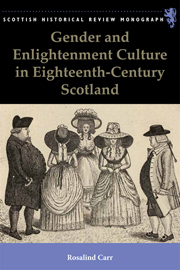Book contents
- Frontmatter
- Contents
- Acknowledgements
- List of Abbreviations
- Introduction: Gender and Scottish Enlightenment Culture
- 1 Masculinity, Homosociality and Intellectual Culture
- 2 Women and Intellectual Culture
- 3 Urbane and Urban Sociability in Enlightenment Edinburgh
- 4 Enlightened Violence? Elite Manhood and the Duel
- Conclusion
- Bibliography
- Index
4 - Enlightened Violence? Elite Manhood and the Duel
Published online by Cambridge University Press: 05 September 2014
- Frontmatter
- Contents
- Acknowledgements
- List of Abbreviations
- Introduction: Gender and Scottish Enlightenment Culture
- 1 Masculinity, Homosociality and Intellectual Culture
- 2 Women and Intellectual Culture
- 3 Urbane and Urban Sociability in Enlightenment Edinburgh
- 4 Enlightened Violence? Elite Manhood and the Duel
- Conclusion
- Bibliography
- Index
Summary
On 14 April 1762 the Edinburgh Evening Courant reported that:
two young gentlemen coming from the tavern, and supposed to be the worse for liquor quarrelled in the parliament close. A scuffle ensued, in which one of them wounded the other with a knife, or some sharp weapon, so dreadfully, that his life yesterday was looked upon to be in danger. The aggressor was next morning taken into custody, and committed to the Tolbooth.
This conflict occurred in public, on the streets of Edinburgh at the height of the Scottish Enlightenment. Whereas coffeehouses, intellectual associations, and convivial clubs are emblematic of the Enlightenment project, this incidence of public violence suggests a failure in the processes of refinement.
With this chapter I integrate the history of violent manhood with that of men engaging in polite conversation and debate in a sociable urbane world, and ask what place personal violence had in the performance of elite manhood. The main focus of this chapter is a study of duelling. As an elite male cultural ritual, duelling provides useful insights into the relationship between public honour, violent behaviour, and men's assertion of gentlemanly status. I examine Enlightenment discourses on duelling before moving on to a study of the place of duelling within urban polite society, the duel's function in men's assertion of social status, and the sociable and public functions of the duel. I will conclude with an examination of the impact of Enlightenment discourse on men's understanding of the duel.
- Type
- Chapter
- Information
- Gender and Enlightenment Culture in Eighteenth-Century Scotland , pp. 142 - 174Publisher: Edinburgh University PressPrint publication year: 2014



